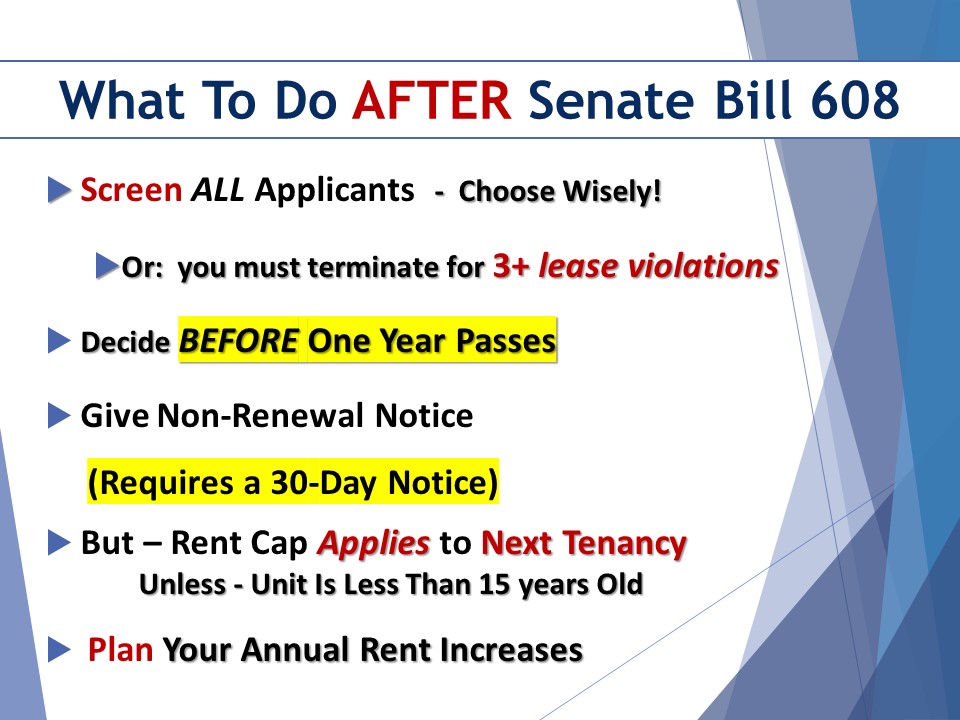Real estate and property management attorney Brian Cox discusses strategies for tenant screening, handling troublesome tenants, raising rent, and protecting yourself in light of the new Oregon Rent Control Senate Bill 608. Considering the strict guidelines for no-cause evictions and for rent increases, landlords have to carefully strategize to remain compliant and watch out for their own interests.
[embedyt]https://www.youtube.com/watch?v=3JEQKz0w9mw[/embedyt]
Watch or Read
Your maximum rental increase is 7 percent a year plus CPI. The published rate right now for CPI is 3.3 percent. The department of administrative service for Oregon will publish that (do the calculations easily here). Currently, no matter what your rent level is, you have a 10.3 percent cap on that increase. If you’re turning over because the tenant moved out by eviction, by voluntary moving, by their own termination notice, or because you gave those three warning notices, you can raise to whatever the market will bear. But if it’s a no-cause turnover, you just wanted to empty them out of that unit, and get them out of there, and either you’re going to pay them a month’s rent, or you don’t own four units, so you’re not going to pay them a month’s rent, you’re going to be capped on the next tenants too.
We’ve discussed delivery notices and the date they had to be delivered by. Month-to-month folks who were in their units had to be given a 30-day notice by February 28. Now, one of the things the law doesn’t answer is whether the 60-day notice went away. Because if you had a tenant who’s already been there a year, and you gave them a notice before February 28, you needed to give them a 60-day notice, and by my math, I don’t think you can jam 60 days in before March 30. So, if it’s under year, it was easy. If it’s over a year, I would not kick any of those folks out if they had lived there over a year, and you hadn’t given them a notice.
Strategies for Notices and Tenant Screening
So what can you do? One strategy is to provide written notice about everything. You can’t use the notices that you have on your computer. You can’t use the notices that you’ve been photocopying for the last 15 years. You’re going to need new notices, and you’re not going to get them yet unless you hire a lawyer. But if you wait about a month or two, they’ll be out there. These new notices, to be valid, have to inform people of the violation and what the law says about these violations. It has to say if you get three of these, we can give you a no-cause eviction notice. If it doesn’t say this magic language, it doesn’t work.
 The other strategy has to do with screening tenants, because you’re going to keep a lot more tenants than you used to, and this is what I already hear my landlords telling me. Where I used to say, well, you know, he’s kind of a sketch guy, but he seems nice, and he’s trying to get ahead, and from his criminal history hasn’t committed any crimes this year. He’s held a job for three or four months, so I’m going to take a chance on him. I’m going to move him in, because if it doesn’t work, I can move him back out.
The other strategy has to do with screening tenants, because you’re going to keep a lot more tenants than you used to, and this is what I already hear my landlords telling me. Where I used to say, well, you know, he’s kind of a sketch guy, but he seems nice, and he’s trying to get ahead, and from his criminal history hasn’t committed any crimes this year. He’s held a job for three or four months, so I’m going to take a chance on him. I’m going to move him in, because if it doesn’t work, I can move him back out.
Now, you better make that decision during the first year, because if you don’t, that is your almost permanent guest. The strategy now is to to screen well, to notice violations, and to decide before one year passes. If you’re approaching that one year (remember it’s the first year, either the natural first year, or first year by reset in tenancy reconfiguration), don’t miss your chance to give them that non-renewal notice. Don’t forget the opportunity to tell them 30 days ahead of time that they’ve been disinvited from living there.
 If you need a real estate attorney, contact Brian Cox.
If you need a real estate attorney, contact Brian Cox.
If you want to learn more about the impact of Oregon Senate Bill 608, visit Pacwest Commercial Real Estate’s Oregon Rent Control Central for the latest information.
Disclaimer
Due to the complex nature of these changes, Landlords should contact an attorney with any questions or clarification of Oregon Rent Control SB 608.



Recent Comments